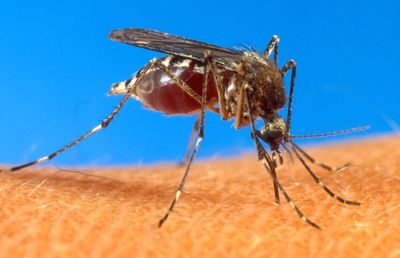Combine heat, small bit of moisture and you’ve got some hungry skeeters

To mosquitoes, some of us are smorgasbords, and others are as tasty as cardboard.
Virtually any place on Earth where the sun’s long, warm rays coincide with the smallest bit of moisture, you will find some of the 3,700 species. Only 150 of them live in North America. Every time a new species bites you, your immune system goes into overdrive, often creating a big, angry welt; bites from more familiar mosquito species are smaller.
Just as not everyone attracts mosquitoes, not everyone who is bitten is bothered by the result.
“Some individuals are more sensitive to bites, so they notice them more,” said Jonathan F. Day, a professor at the Florida Medical Entomology Laboratory in Vero Beach, Fla. “Some people produce more cues than others. They give off more carbon dioxide. Anyone who is really active or has a naturally high metabolism. It’s more than carbon dioxide, though, or mosquitoes would waste a lot of time chasing cars.”
Mosquitoes start their lives as eggs deposited in or near water, even in tiny pools that collect in the bottoms of planters or drainage pipes. A mother can lay up to 300 eggs at a time. The eggs hatch into a larvae, and after a few weeks, they turn into pupae. Within days, those pupae become adults, and if you walk into their path, you are their first meal. They usually live only a few weeks, so their interest in mammal blood is intense.
Mosquitoes find you by searching, the same way a bird dog hunts birds, Day said. Only the females bite, because, as egg-bearers, they are in search of the added nutrition that blood provides. As they zero in on their victim, sight comes into play. The best targets are people in motion, those who provide a large dark target against a light background, and those who provide meals close to the ground, where low wind and high humidity favors insects.
When she lands, she probes for a capillary, then inserts her very thin and sharp proboscis through the skin. She injects you with saliva, which numbs your skin and stops your blood from clotting. Then she drinks for one to three minutes. It’s the saliva’s proteins, not the bite, that irritate human skin and causes the itchy bump we call a mosquito bite.
The most common native mosquitoes, those in the Culex and Anopheles genera, feed mostly after dusk, when it’s easier to bite birds and mammals as they’re settling down to sleep. The Culex and Anopheles mosquitoes also are most likely the bugs you hear buzzing near your ear when you’re out in the woods. They spend their days in the shade of bushes, grasses or leaf litter, near the twin food sources of moisture and microorganisms, and hidden from predators.
So what good are mosquitoes? They do have a niche in the natural world. Their larvae and pupae are attractive food for fish and other aquatic insects, and the adults provide a tasty meal for birds, bats, spiders and dragonflies. The mosquitoes themselves feed on bacteria and algae from rocks, plants and water, as well as on birds, pets and humans.
Prevention comes in three versions: Rid the environment of the mosquitoes, block the insects from finding skin or repel them from the skin they do find.
Mosquito control districts try to eliminate the largest nesting areas for mosquitoes and aim to eliminate them when they’re still larvae and stationary. On an individual level, homeowners should drain standing water on their property, as the smallest bit of undrained rainwater can provide a lovely maternity ward for mosquito eggs.
Finally, repellants work. Emily Zielinski-Gutierrez, a behavioral scientist with the CDC, said DEET-based sprays, lotions and wipes are most effective, although effectiveness does not increase after 50 percent of the solution is DEET. The agency also recommends another synthetic chemical, Picaridin, an odorless preparation good for short-term use.
On the nontoxic front, the CDC this year added to its approved list IR 3535, a biochemical functionally identical to naturally occurring beta alanine. IR 3535 is in such products as the old outdoorsman’s remedy Avon’s Skin-So-Soft lotion. There’s also oil of lemon eucalyptus, which lasts two to four hours, with a “quite pungent” aroma, Zielinski-Gutierrez said. Oil of lemon eucalyptus is not approved for use by children younger than 3.